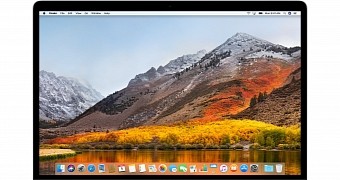Apple released earlier the first beta update of the upcoming macOS High Sierra 10.13.4 software update, which implements a new 64-bit testing mode to prepare users for deprecation of macOS 32-bit support.
Last year, Apple said that macOS High Sierra would be last macOS release to fully support 32-bit apps, and it looks like today's macOS High Sierra 10.13.4 beta update includes a new function that alerts users when they attempt to use a 32-bit app or an app that requires 32-bit software to be installed on the system.
"To prepare for a future release of macOS in which 32-bit software will no longer run without compromise, starting in macOS High Sierra 10.13.4 a user is notified on the launch of an app that depends on 32-bit software. The alert appears only once per app," said Apple in the release notes for macOS High Sierra 10.13.4 beta.
Developers can now test their apps for 64-bit compatibility
The macOS High Sierra 10.13.4 beta release also comes with a new 64-bit testing mode that developers can enable by launching the Terminal, run the sudo nvram boot-args="-no32exec" command and reboot their Macs. This will allow them to test their apps for 64-bit compatibility.
Because the 64-bit testing mode prevents any 32-bit processes from running on the system, Apple recommends developers to disable the functionality by running the sudo nvram boot-args=“” command in the Terminal app and then restarting their machines after they updated their apps to work in 64-bit mode.
Apple also said that the new 64-bit testing mode feature might be improved in upcoming macOS releases to allow developers to test and qualify their apps. However, with the macOS 10.14 major release that Apple will unveil this summer during the WWDC 2018 event, 32-bit support will be terminated for good.
The macOS High Sierra 10.13.4 beta currently supports MacBook Late 2009 or newer, MacBook Air Late 2010 or newer, MacBook Pro Mid 2010 or newer, Mac Pro Mid 2010 or newer, Mac mini Mid 2010 or newer, iMac Late 2010 or newer, iMac Pro 2017 computers and can be downloaded right now from the Apple Developer website.

 14 DAY TRIAL //
14 DAY TRIAL //